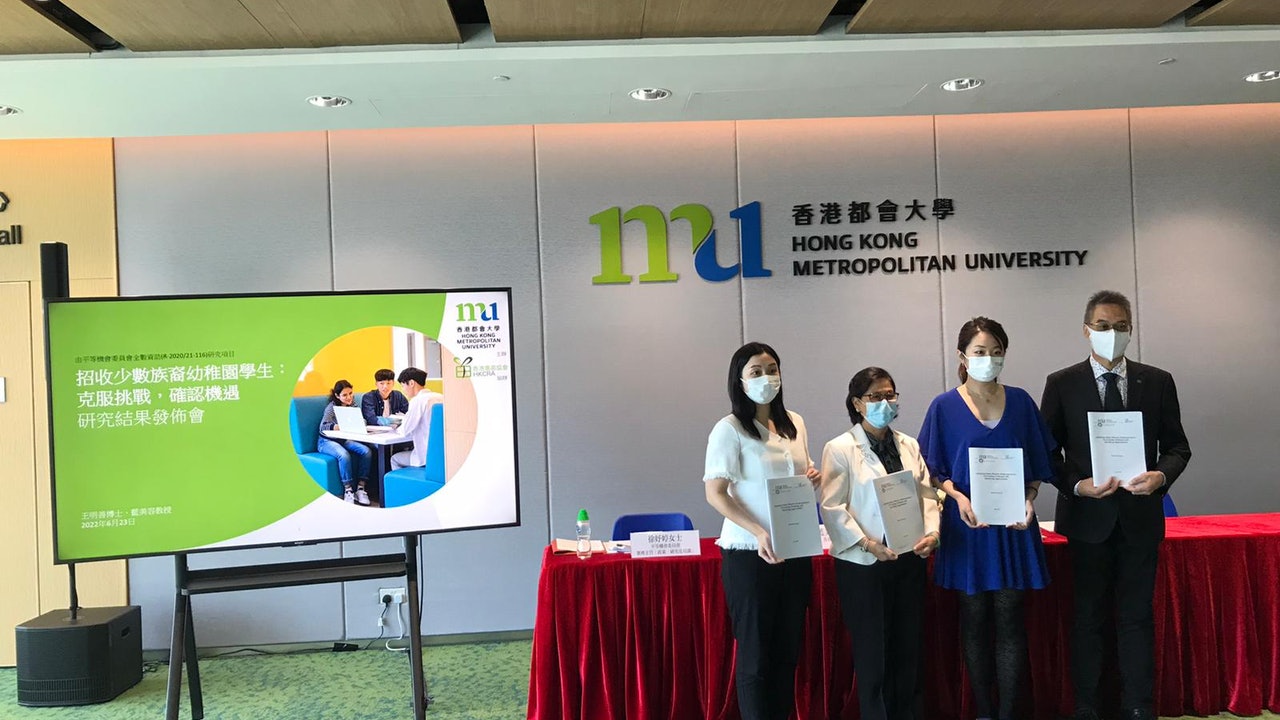The School of Education and Languages of the Hong Kong Metropolitan University has cooperated with the Hong Kong Huimiao Association earlier to launch a research project on the recruitment of ethnic minority kindergarten students, and released a report today (23rd).
The results of the research show that half of the kindergartens surveyed admitted more ethnic minority students due to the new funding. The vast majority of kindergartens arrange for ethnic minority and Chinese students to participate in classroom activities together, but they are faced with the problem of manpower shortage.
The School of Education and Languages of the Hong Kong Metropolitan University has cooperated with the Hong Kong Huimiao Association earlier to launch a research project on the recruitment of ethnic minority kindergarten students, and released a report today (23rd).
(Photo provided by Hong Kong Metropolitan University)
Starting from the 2019/20 school year, the Government has provided subsidies for kindergartens participating in the Kindergarten Education Scheme to encourage local kindergartens to recruit students from ethnic minorities.
The School of Education and Languages of the Hong Kong Metropolitan University cooperated with the Hong Kong Huimiao Association earlier to launch a research project on "Recruiting Ethnic Minority Kindergarten Students: Overcoming Challenges and Identifying Opportunities". Representatives of 161 kindergartens in Hong Kong participating in the kindergarten education plan were selected for follow-up telephone interviews in July of the same year to understand the effectiveness of the policy.
Half of the kindergartens surveyed admit minority students due to new funding
Among the kindergartens surveyed, 107 admitted minority students.
The results show that about half of them admit to admitting more minority students as a result of the new funding.
Of the 46 kindergartens that did not admit minority students, 67.4% were because they did not receive their applications, and 10.9% or because minority families rejected the school's degree offer.
Only three kindergartens indicated that they would not consider admitting minority students, and two of them said they were unaware that the Education Bureau had introduced the new "five-tier" subsidy.
Kindergartens surveyed generally agree that the scheme has the school-running philosophy, school-based curriculum and curriculum model to attract and support minority students.
However, they are concerned about the kindergartens with more ethnic minority students, i.e. 16 or more, i.e. the fourth to fifth tiers, the experience and training of supporting ethnic minority students in the area where they are located, and whether there is any ethnic minority staff to support Factors such as minority students and parents make it more advantageous to recruit more minority students.
The research team pointed out that the survey results reflect that the government's increased funding for kindergartens will help encourage kindergartens in Hong Kong to admit minority students.
(file picture)
Teaching support and resources are important factors in recruiting minority students.
Almost all the respondents have a positive attitude towards recruiting and supporting minority students, but those who admit minority students are significantly more active in recruiting minority students.
Respondents admitted that, to a certain extent, their positive attitude depends on government funding.
Respondents from kindergartens that admit minority students generally believe that the government (89.1%) and minority parents (76.5%) are the most important resource providers, but 35.1% think that they cannot get support from kindergartens or institutions, Only about half of the respondents believed that the overall resources and support received were sufficient to meet their needs.
In addition, 97.8% of kindergartens will arrange for ethnic minority and Chinese students to participate in classroom activities together, and kindergartens will also provide additional support for almost all ethnic minority students and over 90% of their parents.
Most of the respondents believed that supporting minority students and parents would help them improve their abilities (90.8%), aspirations (97.7%) and resources (88.4%), but they believed that the problem of manpower shortage was the first priority.
The team recommends strengthening the publicity of the newly established "Five Tiers"
The research team pointed out that the survey results reflect that the increase in government funding for kindergartens will help encourage kindergartens in Hong Kong to admit minority students. Class funding outreach, especially to kindergartens that currently have no minority students, to inform them of new funding opportunities.
The team also believes that the government can assist kindergartens to establish a support network with other kindergartens, schools, social service and commercial organizations to effectively utilize community resources, and suggest that the government should strengthen the use of different electronic media to provide reference materials and resources.
As more and more kindergartens begin to enroll relevant students, NGOs and research institutes should pay more attention to kindergartens that admit fewer minority students (16 or less).
Dr. Wang Mingshan, Assistant Professor of the School of Metropolitan Education and Languages, pointed out that many kindergartens interviewed stated that the biggest difficulty in recruiting minority students is that they do not have enough manpower and experience. It is hoped that the results of this study will provide valuable reference for policy formulation. Promote an inclusive society.
Professor Lan Meimei, president of the Hong Kong Huimiao Association, pointed out that the government can play a leading role in setting up a working group on minority education, inviting representatives from preschool education, non-governmental organizations, social services and business organizations to discuss support strategies, and help establish a support network, so that kindergartens and The students concerned are given appropriate support.
Rongle Club released a language education policy research report and urged the Education Bureau to open preparatory classes for ethnic minorities.
Education|Chinese Language Barrier Makes it difficult to go up
01 Community













